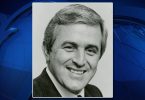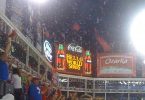He’s been called many things.
A one-trick pony. A human strikeout machine. The embodiment of all that’s wrong with today’s baseball.
The former manager of the Rangers even called him Joe. Joe Gallo. Like the notorious New York mobster.
When you’re batting .206 with 207 strikeouts, they’re likely to call you anything, I suppose.
But lift your OPS to a Ruthian 1.116 and launch six games’ worth of baseballs deep into the Texas night and, as Joey Gallo learned Monday, the American League names you its Player of the Week.
A validation? Sure. But the Major League Baseball season is 27 weeks, not just one.
For five seasons now, friends and learned baseball men have sat next to me in press boxes and dismissed Gallo with a wave of the hand. Not enough contact, they said. Just another Dave Kingman.
The latter criticism is not only invalid, it’s offensive. Joey Gallo not only regularly delights his teammates with towering home runs, but also is one of the friendliest and most cooperative professionals in the Texas clubhouse.
Dave Kingman, on the other hand, was a well-loathed creep. He played for seven different teams in 16 seasons, several of which ended with Kingman not being worth either the dollars or the annoyance.
Kingman’s career ended with 1,575 hits, 442 home runs and a slash line of .236/.302/.478/.780 . He struck out 1,816 times in an era when whiffing wasn’t quite so fashionable.
My personal problem with Kingman goes back to 1986. My good friend and former colleague at the Baltimore News-American, Susan Fornoff, was in her second year of covering the Oakland A’s for the Sacramento Bee.
Kingman didn’t like the idea of women covering baseball. “A lady should be a lady,” he tried to explain.
On June 23, 1986, a security guard at Royals Stadium tapped Fornoff on the shoulder and handed her a “gift” from the A’s’ clubhouse, a corsage box. When Sue lifted the box, she realized that something was moving inside.
It was a live rat, around which a tag was attached which read, “My name is Sue.”
[Cue the Psycho shower scene music here].After the game, reporters gathered around Fornoff in the clubhouse and asked what happened.
“Here – you need a Kleenex?” Kingman mocked from across the room. “Don’t cry, don’t cry.”
Kingman told the writers it was just a joke.
But the Oakland manager, the great Jackie Moore, correctly remarked, “We can’t ignore this,” and benched Kingman until A’s general manager Sandy Alderson could get to town and discuss the incident with him.
Kingman finished the season with his typical numbers — .210/.255/.431/.686 and 35 homers – and the A’s declined to re-sign him, ending his major league career.

Kingman’s other day of social infamy came on August 7, 1980, when Chicago decided to honor him at Wrigley Field for his two All-Star seasons with the Cubs.
“Dave Kingman Day,” the giveaway T-shirts read.
Except Kingman didn’t show up. He was on the disabled list and decided he’d rather spend the day fishing.
Can we scratch, therefore, all future Joey Gallo comparisons to the rat-gifting, gender-harassing, inconsiderate Kingman?
I can’t separate Kingman, the one-trick home run hitter, from Kingman, the lousy human being.
But Gallo not only has a home run swing, he also has a boy-next-door personality. He grew up in Las Vegas, playing Little League ball alongside Bryce Harper, but the only thing Vegas about Joey Gallo are the neon home runs he hits.
A veteran baseball writer once described Kingman diving for a line drive in the outfield as looking “like a can of paint being thrown from a moving car.”
Gallo, however, is all athlete. Evidence suggests that he could comfortably play five different positions on the field, including center field.
Baseball’s new math and measurements seem to not quite know what to make of Gallo. It’s likely that no hitter in the majors sees more frequent or more extreme defensive shifts.
I believe in the science of baseball’s analytics. My one problem with it, though, sits at the root of the Gallo criticism – namely, its inconsistencies as a predictive tool. Projections are good, until they’re not good.

Young players grow up. The fog sometimes parts. They figure it out. They improve.
Gallo was 21 when he was first called up in 2015. Wouldn’t it be reasonable to assume that a 25-year-old Gallo is better than a 21-year-old one?
Some, granted, never get it. They never grasp how opposing pitchers are pitching to them. They can’t make the necessary adjustments.
More and more, though, Gallo seems to be feeding off the influence of Shin-Soo Choo and Elvis Andrus, who regularly grind out their at-bats.
“It’s tough to always have that perfect approach at the plate and not ever chase out of the zone,” Gallo told longtime beat writer Jeff Wilson. “But you’re not always going to be perfect. You’re going to go through funks. I was saying that even when I was killing it.
“That’s baseball, and that’s the way it goes.”
Gone is the big looping motion that used to trigger every Gallo swing. He knows the strike zone now – his strike zone.
He doesn’t need to hit .273, his average after Monday night’s game, to be an All-Star.
“If I’m getting on base at a good clip and I’m slugging at a good clip, that’s my job.” Gallo said. “It’s different when you’re a contact guy or a speed guy hitting for a low average. For me it’s about producing runs, and I’ve done that. But I want to get better. I don’t want to hit .205 my whole career, obviously.”
If last week was a hint of what’s to come, Gallo will more than do his job.
Just stop with the Dave Kingman comparisons.
Joey Gallo is a better ball player and a better person than that.







